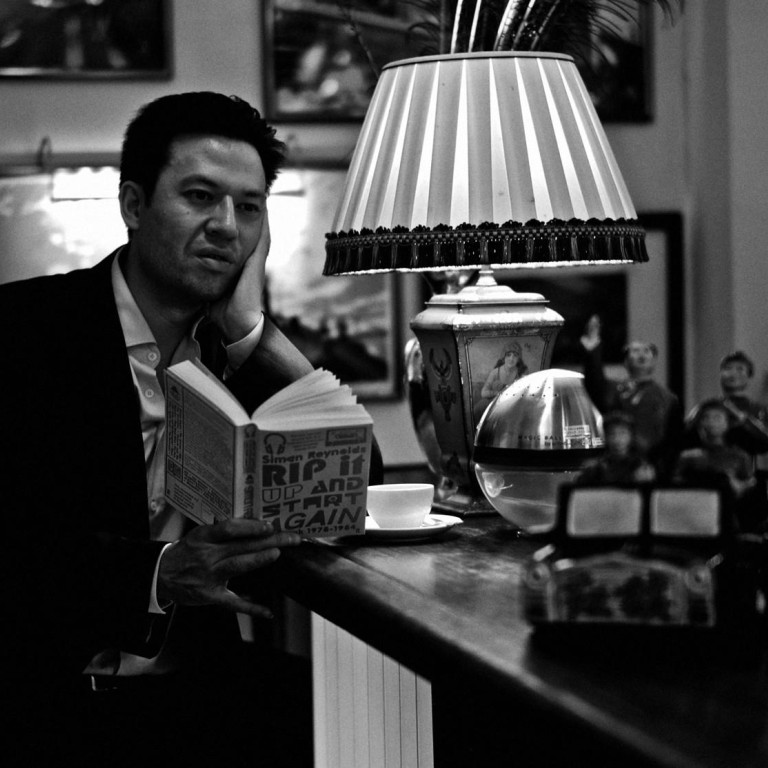
Renaissance man
Duncan Jepson - lawyer, writer and filmmaker - puts ideas into action, writes Pavan Shamdasani
Despite all its opportunities, fast pace and thriving arts scene, Hong Kong often seems to be more about ideas than action. People may talk a lot, but don't always follow through on their seemingly brilliant plans.
That's never been a problem for Duncan Jepson. A lawyer by day, Jepson balances his already busy career with a number of creative endeavours: writing books and graphic novels, making films and documentaries, editing the magazine, and running a literary agency.
The average creative type would be happy with any of those, of course. But how does a man who holds the full-time position of regional head of legal at a large asset-management company find the time?
"It all starts off with stories. As a lawyer, I'm used to writing professionally, but once you start with stories, you realise there's so much to learn," he says. "And then, every other day, you learn that there's so much more to learn and it becomes a constant process of trying and failing. You begin to judge the potency of your message and start to do things very quickly, say over the course of lunchtime or an evening, and then get back to the job."
It's a simple explanation for a very thorough, thought-out process, one that no doubt took most of his life to hone. Born and raised in Yorkshire, England, Jepson spent most of his 20s involved in manufacturing on the mainland before training as a lawyer and moving to Hong Kong. But while his career ambitions were always firmly set in his mind, Jepson's deep interest in telling stories held just as important a place.
Unlike the many book-obsessed people who dream of becoming a literary genius, Jepson never talked about wanting to write. He just started writing - first for himself, and then articles for free magazines and specialist publications related to his fields.
"I picked up jobs writing all sorts of things: columns, features, articles," he says. "I wrote as much as possible and tried to bring something vaguely creative into it. I learnt how to create a voice, how to create a narrative, to be able to tell the difference between something strong and something vague."
The basic idea is take every opportunity you can and learn from it
Around the same time, he was given the chance to work as a sound man on a low-budget horror film ("basically just holding the boom mic," he says). He took it, and when the movie's producer quit, he took that job too. The initial experience was daunting, but the chance to work in a world he admired gave him yet another medium in which to tell his tales.
"The basic idea is take every opportunity you can and learn from it. That's often ignored or avoided by people who are waiting for the big opportunities," he says. "I never believed in that. I always believed in exploring something before rejecting it."
It's easy to see how those small opportunities have blossomed: four documentaries produced for the Discovery and National Geographic channels on such subjects as poverty in Nepal and expression in China; the critically acclaimed 2011 women's literature novel ; and now , the first instalment in what is planned as a detective series.
The switch sounds strange: moving from such intellectual avenues as hard-hitting social issues and world literature, into the genre world of crime, serial killers and hard-boozing gumshoes.
"The story is really a social and political question about how elderly Asian generations view themselves and look at their history," Jepson says. "How an elderly individual sees his history as full of regret and bitterness, and then expresses it as a serial killer.
"And then there's the detective from modern Asia, which is a very different world, who is tasked with catching him. The story isn't typical, but it does explore the weight of history, of humiliations and all that comes with that."
Jepson's work attracted a major-name publisher: Quercus, the small London house that took a chance on Stieg Larsson's and became the go-to name for high-quality crime fiction. The book won't be out until sometime next year, but Jepson is already working on its sequel, this time focused on Britain. But it wouldn't be characteristic of Jepson, a modern-day renaissance man, to work on just one project, so he's also collaborating with others on a fifth documentary, and a graphic novel.
Now Jepson is starting to channel his energy into helping others, with a couple of charity projects in the works. The first, Project Share, provides internships, creative courses and other opportunities to people in less privileged districts such as Tin Shui Wai. The second, Liberty Asia, is a response to the work he's done in Afghanistan and Nepal, exploring how infrastructure technology can help fight slavery in those countries.
There isn't enough space here to describe all of Jepson's many hats - we didn't even start on or his agency. Still, Jepson says it's easier than you think: just do one thing at a time.
"Ten years ago when I was trying to make things happen, I noticed there was lots of talk and little action," he says.
"So I came up with a basic approach: if I got through the day having achieved one thing that contributed and pushed the larger thing forward, then that was a good day. Then as you become more aware about what makes a difference, you do two things and three things, and before you know it, you're actually getting things done."
